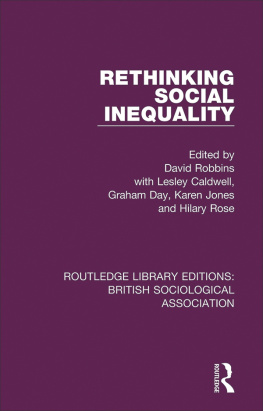First published in 1982 by Gower Publishing Company Limited
This edition first published in 2018
by Routledge
2 Park Square, Milton Park, Abingdon, Oxon OX14 4RN
and by Routledge
711 Third Avenue, New York, NY 10017
Routledge is an imprint of the Taylor & Francis Group, an informa business
1982 British Sociological Association
All rights reserved. No part of this book may be reprinted or reproduced or utilised in any form or by any electronic, mechanical, or other means, now known or hereafter invented, including photocopying and recording, or in any information storage or retrieval system, without permission in writing from the publishers.
Trademark notice: Product or corporate names may be trademarks or registered trademarks, and are used only for identification and explanation without intent to infringe.
British Library Cataloguing in Publication Data
A catalogue record for this book is available from the British Library
ISBN: 978-1-138-49942-3 (Set)
ISBN: 978-1-351-01463-2 (Set) (ebk)
ISBN: 978-1-138-47731-5 (Volume 17) (hbk)
ISBN: 978-1-351-10508-8 (Volume 17) (ebk)
Publishers Note
The publisher has gone to great lengths to ensure the quality of this reprint but points out that some imperfections in the original copies may be apparent.
Disclaimer
The publisher has made every effort to trace copyright holders and would welcome correspondence from those they have been unable to trace.
Rethinking Social Inequality
Edited by
DAVID ROBBINS
The University College of Wales, Aberystwyth
with
LESLEY CALDWELL, GRAHAM DAY, KAREN JONES and HILARY ROSE
British Sociological Association, 1982
All rights reserved. No part of this publication may be reproduced, stored in a retrieval system or transmitted in any form or by any means, electronic, mechanical, photocopying, recording, or otherwise, without the prior permission of Gower Publishing Company Limited.
Published by
Gower Publishing Company Limited,
Gower House, Croft Road, Aldershot, Hampshire, England
British Library Cataloguing in Publication Data
Rethinking social inequality
1. Equality
I. Robbins, David
305 (expanded) HM146
ISBN 0-566-00557-3
Printed and Bound in Great Britain by
Robert Hartnoll Limited, Bodmin, Cornwall.
The study of inequality has been a central project of sociological enquiry, past and present, to the extent that it does not so much constitute an area or specialty within sociology as the very stuff of the subject itself. In British sociology this engagement with the issue of inequality has taken a particular form. The investigations of late-nineteenth century poverty by Rowntree and Booth established a research tradition whose influence has persisted until the present day (Booth, 1903; Rowntree, 1901). The periodic rediscovery of poverty and deprivation in welfare state Britain (Titmuss, 1958, 1960; Coates and Silburn, 1973; Townsend, 1979; Field, 1978, 1980) builds on the tradition of the nineteenth century pioneers.
Given that the political contexts in which the tradition emerged and developed were characterised by class conflict and compromise, it is hardly surprising that it focussed primarily on the inequalities of class and that the deprivations of the working class were its most characteristic object of study. The emphasis on class did not, however, exclude a concern with the position of other disadvantaged groups: women, children and the old (Land, 1969; Piachaud, 1979; Townsend, 1963; Wedderburn, 1968).
It was not so much its subject matter which distinguished research in this tradition as the way in which inequality was conceptualised and studied. The style of the research was characterised by certain distinctive features which must be understood in relation to its methodological orientation and the political contexts in which it developed.
In the first place the British tradition has been predominantly concerned with particular aspects of inequality; those of income, educational achievement and, to a lesser extent, wealth. This can be partly explained in terms of a political concern to monitor the workings of a welfare state established to contain the mobilisation of radical sentiment prior to and during the Second World War. The post-war political context was predominantly social democratic, in that the redistribution of income and wealth by the welfare state was seen as the remedy for class inequality. This was consistent with a sociological tendency to define classes as clusters of manual and nonmanual occupations distinguished primarily by the extent to which they possessed these resources. A related political emphasis saw increased social mobility through educational reform as an important means of breaking down the barriers of class in British society (Fenwick, 1976; CCCS, 1981). In both cases there was a congruence between prevailing political concerns and the aspects of inequality highlighted by contemporary sociology.
Important as these influences were, it seems likely that the focus on income and educational achievement was also the result of the methodological orientation of mainstream British sociology. Positivist orthodoxy required that social life be described in terms of sets of variables that could be operationalised and measured empirically. The distribution of income and educational achievement fitted this methodological bill to perfection. In contrast, aspects of inequality which were not readily amenable to quantitative measurement tended to disappear from view. The perspective was, by its nature, silent on the distribution of economic and political power and on issues of cultural and legal domination and subordination.
The distinctive character of the British tradition is not confined to its concentration on particular aspects of inequality but extends to the way in which these inequalities are conceptualised in distributional terms. The empiricist inclinations of the studies implied not only the focus on empirically measurable types of inequality but also the operational definition of the categories across which such inequality varied. Social classes disappeared behind the terminology of income brackets and quartiles, or at best, were treated as aggregates of occupations. As a result inequality was conceptualised as the differential distribution of desirable goods (e.g. money, educational qualifications) between more or less arbitrarily defined categories. There was a tendency to lose sight of the fact that inequality is inherently relational : the deprivation and powerlessness of one group following as the necessary consequence of the endowment and power of another. Also lost was an appreciation of the extent to which these relations of inequality are the axes of continuing conflict and change.

















